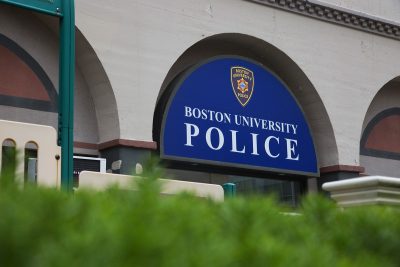
Following recent national protests against racial injustice and police brutality, Boston University is planning to create a Community Safety Advisory Group in an attempt to strengthen relationships between students and campus police.
President Robert Brown announced the initiative in an email to the BU community Tuesday.
The group will aim to foster a safe and welcoming environment for all on campus, the email stated, and will partner with the BU Police Department to do so. The makeup of the group has not yet been devised, but Brown wrote he would like for it to include many students along with faculty and staff.
Dean of Students Kenneth Elmore and Dean of the School of Law Angela Onwuachi-Willig will be in charge of determining who should serve on the group and what the group will do.
BU Spokesperson Colin Riley said much is unclear at this time, but he has confidence in Elmore and Onwuachi-Willig’s ability to create a strong group.
“Dean Elmore has a long history at Boston University, knows the student body and their concerns, what the role of faculty and staff are in the community,” Riley said. “And I know the dean, certainly, from the area of law will have some idea of what she is looking for, not only in composition but what their mission, their charge will be and how they function.”
Kelly Nee, chief of police and executive director of public safety at BUPD, said she hopes the department’s collaboration with the group will help promote transparency.
“I want to be able to educate our community about what we are, what we do, what my offices do, what our training looks like,” Nee said. “I want people to be assured that we’re an accredited police department. We want to practice best practices.”
Nee added that she hopes the advisory group will help BUPD make connections with the student body.
“When we’ve tried to do some outreach, we’re just not successful in bringing in interest, in bringing students to events that we might be hosting to try to provide information for them to keep themselves safe,” Nee said. “So, if this is successful with building bridges, then that’s a big plus to me as well.”
Riley said the University always has and will continue to promote a diverse and inclusive campus, but he is not sure at this time how big of a role the new advisory group will play in promoting that message.
“We always want to be welcoming, inclusive and respectful and instill confidence in the fairness of how the University operates,” Riley said. “The focus, of course, is in the role of the police and how the community is best served by them.”
Nee said both she and BUPD as a whole received implicit racial bias awareness training in January and she wants her department to reflect this.
“There’s so many issues around policing right now,” Nee said, “and we were committed to the best of training that we possibly can to provide the best services.”
Nee said it’s important to ensure campus police are capable of serving a diverse community and de-escalating tense situations, as well as “making good decisions” on the job. That starts not only with training, she said, but also effort in recruiting the appropriate candidates.
More information about the Community Safety Advisory Group, including who will comprise it, should come out in August.
Rachel Kubrick, a 2020 graduate of the College of Arts and Sciences, said that while as a white woman she has never faced any form of police brutality, she is skeptical this initiative will truly meet the needs of a student body as diverse as BU.
“I appreciate the fact that they’re trying to do something,” Kubrick said. “But also I feel like it might be kind of lip service and not really listening to what at least students I know have been saying.”
Kubrick said she likes that the group will incorporate student input, but feels the University would receive more appreciation if it instead defunds BUPD or severs ties with the Boston Police Department, as many students have recently asked and petitioned for.
Ahnaf Eram, a rising junior in CAS, did a program in high school during which he worked with BPD and learned about the way it operates. He said he met many friendly officers, but there were also openly racist individuals within the force.
Eram said that although the advisory group could help, the change needs to start with the hiring process.
“It’s very superficial because if you do not change what’s in the core of BUPD, then you cannot make a change,” Eram said. “You have to assess each individual officer and check their background and see if these people are good to be police officers… if they have any racial complaints or anything like that.”
Eram added that he would like to see Student Government collaborate with BUPD to make further changes, and hopes the University installs some form of anonymous complaint platform for students to voice grievances against individual officers who they feel have committed unjust actions.


















































































































Ahnaf Eram • Jun 25, 2020 at 7:52 am
Great work Melissa! Like your use of primary sources 😉